EXCLUSIVE: Leaked Report Finds Harvard Professor Failed Burden of Proof in Misconduct Probe
A leaked 133-page analysis concludes Professor Ryan Enos’s affirmative defenses in a 2022 journal probe were false and misleading — putting Harvard's federal funding at risk.
DOWNLOAD & SHARE THE FULL REPORT→
This report is not a final Harvard finding. It is an interim report prepared by volunteers to assist the Faculty of Arts and Sciences in ensuring compliance with federal research regulations. It has been formally submitted to Harvard officials, and Stacey Springs, Director of Research Integrity at Harvard University, confirmed receipt one week ago.
In March 2022, a leaked complaint from Harvard was spiked by The Daily Caller News Foundation over legal risk. The following day, it was published independently on my Substack.
That complaint alleged that Ryan Enos, the director of Harvard’s Center for American Political Studies, had falsified data to “prove” his pet theory: Racial Threat Theory, a branch of Critical Race Theory claiming that white people fear black people.
Harvard never investigated Enos. Instead, its administrators circled the wagons. The American Journal of Political Science (AJPS) sent a cease-and-desist to suppress coverage. The report also faults AJPS editors for willful disregard of COPE/Wiley ethics guidelines in handling the complaint.
Meanwhile, questions also emerged about the role of then–Dean Claudine Gay. A 2022 leak I obtained showed that the decision to dismiss the misconduct inquiry carried the signature of Peter Marsden, a retired sociologist serving as chair of Harvard’s Standing Committee on Professional Conduct. Marsden’s dismissal letter rested on procedurally invalid grounds that ran directly contrary to Harvard’s own stated research integrity policies. According to those policies, only the Dean of the Faculty of Arts and Sciences has the authority to take final action in such cases. That means Marsden could not have closed the matter without Dean Gay’s knowledge and approval.
This created a clear conflict of interest: Enos’s research leaned heavily on Gay’s own scholarship; a fraud finding would undermine hers.
A Harvard spokesperson acknowledged to me that Gay saw the misconduct inquiry and decided it should be "readily dismissed."
This leaked internal document shows Harvard’s official justification for dismissing the complaint was that it “does not fall within the purview of the Standing Committee on Professional Conduct.”
Compare that statement to Harvard’s own policies on research integrity:
Harvard Policies: “The Standing Committee on Professional Conduct (CPC) handles allegations of research misconduct involving FAS investigators.”
Harvard CPC (in Enos’s case): “Allegations of research misconduct by FAS faculty members do not fall within the purview of the CPC.”
It is difficult to reconcile these two statements. On paper, the CPC exists precisely to handle allegations of misconduct by FAS faculty. Yet when the allegation landed on their desk, they declared it outside their jurisdiction, without referring it to any other administrative body. This was a direct violation of federal regulations, which require referral if one entity cannot proceed.
This was not a procedural oversight. It was a procedurally indefensible justification, tantamount to a false exculpatory statement. In legal practice, such statements are often treated as evidence of consciousness of guilt.
And the instinct to suppress scrutiny was not confined to Enos’s case; it was mirrored in Gay’s own record, when, in 2001, Gay solo-authored an American Political Science Review article but refused to share the underlying data when pressed — an incident I first covered in Dossier (below), later echoed by the New York Post and Daily Mail.
Harvard insiders believe that when this resurfaced in late 2023, it became the final straw for the Corporation. Initially, the Corporation signaled a slap-on-the-wrist plagiarism correction in the mid-December Crimson announcement. But the prospect of a Tessier-Lavigne–style public inquiry into her withheld data was intolerable. On December 27, 2023, senior fellow Penny Pritzker pressed Gay to announce her resignation, effective January 2, 2024.
That ended her short presidency, but not Harvard’s troubles.
In April 2025, three federal agencies—the GSA, HHS, and Department of Education—formally warned Harvard that it had “failed to live up to both the intellectual and civil rights conditions that justify federal investment.” The government gave Harvard until August 2025 to implement reforms and submit quarterly compliance reports certified for accuracy.
Harvard’s reply was the usual boilerplate: promises of “lasting and robust structural, policy, and programmatic changes.” Yet here we are, seven years after the Enos case began, and Harvard still hasn’t complied with its own research integrity policies, let alone federal regulations.
The Enos coverup now looms as the test case for whether Washington will finally enforce the rules—or let Harvard skate once again.
Report Highlights
I emailed this report directly to Ryan Enos for comment, but he did not reply.
I reached out to AJPS to ask what steps, if any, it planned to take in light of this new report. The editors replied: “Thanks for your note. We have no comment at this time.” They copied the executive director of the Midwest Political Science Association.
1. Phantom Voters
Allegation (2022): Enos’s 2004 dataset reported turnout at 59.08%, while the official Chicago Board of Elections rate was 74.63%. This implied a surplus of more than 100,000 “non-voters,” a mathematical impossibility unless the dataset was fabricated.
Defense (2022): Enos did not directly deny the discrepancy. He suggested that voter files can contain normal inaccuracies, implying the difference could be explained by quirks in the commercial data.
Report Analysis (2025): Investigators concluded the discrepancy could not be explained away. The replication concludes: “without [these phantom voters], the author’s empirical results would have been null effects at best (and possibly significant effects in the opposite direction).”
2. Misrepresentation of Data Sources
Allegation (2022): Enos wrote that he “obtained the 2004 Illinois voter file,” but in fact he used a commercial VCS/L2 file that relies on imputation and “educated guesses.” He also failed to disclose the official Illinois State Board of Elections dataset, which was readily available.
Defense (2022): Enos admitted using a commercial file but characterized it as standard practice, claiming this did not affect his conclusions.
Report Analysis (2025): He did not disclose the existence of the official Illinois State Board of Elections dataset, a deception that gave false reassurance of accuracy. Investigators said this omission and misstatement violated disclosure standards, and this misstatement alone violates Harvard and federal disclosure standards. Representing an error-prone commercial file as an official state voter file gave false reassurance and raised “serious concerns about intent.”
3. Inflated Effect Sizes
Allegation (2022): Between drafts of his work, Enos altered reported effect sizes — each time in the direction of his preferred hypothesis.
Defense (2022): Enos did not specifically address these changes in his memos, suggesting that revisions were part of the normal process of refining estimates.
Report Analysis (2025): Investigators found the pattern systematic, not incidental. The selective inflation without disclosure was classified as data manipulation inconsistent with good-faith error.
4. Voter File Irregularities
Allegation (2022): Replication efforts (code available here) showed discrepancies between Enos’s 2012 working paper and his later AJPS article/book. Adjusting only the voter registration cutoff (2000-10-10 vs. 2000-01-01) failed to reproduce his 2012 estimates, implying undisclosed alterations.
Defense (2022): In memos, Enos insisted his datasets were consistent and attributed differences to benign coding quirks.
Report Analysis (2025): The replication file reproduced his published figure exactly but showed that results collapsed under even minimal changes, pointing to hidden alterations. These manual alterations resulted in ‘‘a minimum of 240 falsified observations (through additions, deletions, and/or modified variable values), and at least 4 observations were fabricated (entirely made up by the author, as they did not exist in the initial dataset). Although the author vehemently denied the existence of this irregularity, no plausible deniability exists.’’
5. Precinct File Irregularities
Allegation (2022): Complaints noted unexplained inconsistencies in precinct-level datasets.
Defense (2022): Enos later admitted to deleting precincts and altering vote totals but framed these as clumsy SQL errors: “I would not claim to be an elegant or efficient SQL programmer.”
Report Analysis (2025): Investigators found that Enos “failed to meet the burden of proof on all counts,” and dismissed his excuses — labeling discrepancies as “guesswork” or “not unusual” — as invalid. The report concludes that undocumented deletions and alterations amount to falsification under both Harvard’s policies and federal law, and specifically documents:
12 duplicate observations,
390 unjustified deletions,
110 inexplicable non-deletions,
Incomplete records: Missing 1996 election results and relying on “formatted” reassignment files he created himself, with no verifiable link to official sources.
Incomplete code: His SQL file only flagged precincts for deletion or change but did not include code showing how he applied these to construct the datasets. By definition, that omission itself constitutes falsification.
Severe coding errors: Catastrophic syntax and logic flaws — invalid file paths, copy/paste mistakes, structural errors — produced undue deletions, miscalculations of vote totals, and cascading distortions across up to 11 variables.
Non-uniform application: His datasets show precinct changes inconsistent with his own SQL code, proving they were not generated programmatically.
Other irregularities: Duplicates with contradictory values and out-of-sequence observations indicating manual cut-and-paste tampering.
Summary
Across all categories, investigators found that Enos’s affirmative defenses — whether blaming coding errors, normal voter file quirks, or inadvertent omissions — failed to meet the burden of proof on all counts. Under federal rules, once irregularities are identified, the accused must provide credible documentation to substantiate their defenses. Enos did not.
What Is an Affirmative Defense in Research Misconduct Cases?
In research misconduct proceedings, an affirmative defense is not just a denial. It is a specific kind of response in which the accused acknowledges irregularities in the data but offers a legally or ethically defensible justification such as an honest error, inadvertent omission, lack of intent, or the delegation of work to another party.
Federal rules make clear that the burden of proof rests with the respondent. Once irregularities are identified, it is the accused who must produce credible evidence, lab notes, datasets, or documentation to substantiate their defense. If they cannot, the defense fails. And under federal standards, a failed affirmative defense is typically treated as proof of misconduct, whether classified as reckless or deliberate.
Federal Rules Ignored
Institutions that receive federal research funding are legally bound to investigate allegations of research misconduct by following a defined process:
Review affirmative defenses raised by the accused and issue a final determination;
Make findings on whether misconduct was reckless or deliberate and state who is responsible;
Retain records and report to the appropriate federal agencies that oversee compliance and can sanction institutions that obstruct the process.
Harvard did none of these things in the Enos case. Instead of reviewing defenses and issuing findings as the law requires, it dismissed the complaint on invalid grounds. This was a violation of federal regulations that condition Harvard’s accreditation and its access to hundreds of millions in taxpayer funding.
Regardless of whether Enos’s research was federally funded, Harvard is bound by its own policies to investigate allegations of misconduct and preserve records for at least seven years. That clock can be reset when new evidence emerges — including the 2022 AJPS investigation, Enos’s affirmative defenses in the 2022 memoranda, Harvard’s December 2024 statement acknowledging irregularities, and now this report documenting his failed affirmative defense.
If Harvard were to destroy records when the retention period lapses in October 2025, it would expose itself to potential liability for spoliation of evidence and obstruction of justice.
Precedents of Failed Affirmative Defenses at Harvard
Harvard has confronted this scenario before. In multiple high-profile cases, faculty members attempted affirmative defenses — and failed:
John Darsee (1980s): A cardiology researcher whose fabricated data collapsed when his defenses were scrutinized, leading to one of the most infamous misconduct scandals in NIH history.
Marc Hauser (2010): A psychology professor whose affirmative defenses were examined line by line under Harvard’s own policies and applicable federal law. Investigators classified his actions as deliberate falsification after he failed to substantiate his claims.
Francesca Gino (2023): A Harvard Business School professor who blamed data issues on honest errors and alleged coauthor tampering — a claim dismissed as implausible. Her defenses failed, and she later sued, arguing male faculty (likely Enos) were treated more leniently.
These precedents show how Harvard has historically handled failed affirmative defenses: investigate them, reject them if unsupported, and issue formal findings of misconduct.
Enos’s case is the outlier.
With his track record, he fits squarely into the category of problematic faculty highlighted in the April 11, 2025 federal letter that warned Harvard had “failed to live up to both the intellectual and civil rights conditions that justify federal investment.” He is also tied to the Kennedy School, one of the very departments cited for Title VI violations.
And Enos has not stayed on the sidelines. He has repeatedly thrust himself into Harvard’s political battles:
In 2019, he served on Claudine Gay’s ethnic studies search committee, whose stated goal was a cluster hire of "new faculty members [...] who specialize in Asian American, Latinx, and Muslim American studies" — a mechanism for recruiting scholars of specific ethnicities.
In 2021, he wrote to President Larry Bacow asking him to condition Harvard affiliation on an ideological litmus test, "barring or removing people from [the Harvard] university community" depending on their views on the January 6 Capitol events, even going so far as to offer his “services” to help enforce ideological tests.
In 2023, he co-authored a Crimson op-ed demanding protection for pro-Palestine student activists, and in 2024 he defended the disruptive encampment in Harvard Yard as “The Case for Leaving Protesters Be.” Later that year, he was disciplined for joining a pro-Palestine “study-in” inside Widener Library.
In a March 2025 article, The College Fix reported that "Enos [...] supported the removal of Republican U.S. Rep. (and Harvard graduate) Elise Stefanik from the school’s Institute of Politics Senior Advisory Committee due to her objections over certifying Joe Biden the winner in 2020."
His activism made him politically useful to Harvard administrators, and rather than investigate, they chose to shield him.
The new report removes any ambiguity. It finds Enos failed to meet the burden of proof in defending against data falsification, documenting a pattern of reckless errors and anomalies that can only be explained as deliberate manipulation. Under federal standards, even recklessness alone would still require a retraction.
This is not arcane academic hair-splitting. Enos’ data:
Anchored his Harvard tenure case.
Became the backbone of a Cambridge University Press book.
Fed into Critical Race Theory claims about “white fear” — a narrative that shaped DEI policy across academia.
Expert Counterpoint
Not all experts agree with the report’s conclusion. To stress-test the report and include a contrary view, I asked Dr. Michael P. McDonald, a Professor of Political Science at the University of Florida to review the material:
“I read the allegations and Enos’ response. I’ve worked with voter files for over thirty years and published about their properties. My initial reaction is that Enos’ response is reasonable and that he did not engage in research misconduct. Enos correctly states potential voter file issues which may explain the discrepancies among the total number of voters and nonvoters (I can think of even more than those in the provided excerpts). Further, as Enos notes, for his conclusions to be misleading using difference-in-difference models, it would have to be that the discrepancies among racial groups and their geographic location correlate with his findings. That is not alleged here. The best way to challenge Enos’ findings is to replicate his research with new data.”
But two core findings in the report cut against this defense:
Systematic bias. The “phantom voters” and precinct changes consistently push results toward Enos’s preferred hypothesis—not random noise.
Replication failure. Key estimates don’t reproduce across Enos’s own files (2012 → 2016), despite his claims of continuity.
Under federal standards, once irregularities surface, the burden shifts to the researcher to provide verifiable explanations. The report concludes Enos did not, rendering his defenses inadequate under Harvard policy and federal law.
A History of Convenient “Errors”
Enos has previously claimed such errors were minor and unintentional. But his career shows a pattern of sloppiness — or worse:
2009 (QJPS corrigendum): The Quarterly Journal of Political Science published a correction to Enos’s replication code and survey design after a ‘‘coding error.’’
2018 (PNAS correction): One of Enos’s PNAS papers contained a mis-typed survey question in its tables and figures. PNAS initially refused to correct it, but reversed course and issued a formal correction after outside scholars raised concerns.
Public Criticism and Repeated Corrections
Enos’s irregularities have not gone unnoticed in the wider scholarly community. Over the past decade, his work has repeatedly drawn scrutiny and public criticism:
2014 – PNAS critique: In Proceedings of the National Academy of Sciences, van Hoorn (2014) identified flaws in Enos’s work, questioning its robustness and highlighting methodological gaps.
2018 – Gelman’s blog: A devastating public comment on Andrew Gelman’s Statistical Modeling blog dissected Enos’s PNAS article, accusing him of pseudoscience: “Both Enos and his advisees make conclusions unwarranted by the data.” The commenter further warned that his students were being pushed in the wrong direction, harming their career prospects.
2022 – Harvard statement: In March 2022, Enos was forced to issue a statement acknowledging the removal of an “inadvertently” retained IP variable from a dataset — an error so serious it had triggered accusations of fraud when flagged to Harvard’s public relations office.
Harvard Distances Itself from Enos
Ten months ago, when I teased today’s bombshell, I reached out to Harvard for comment. Here’s the statement Harvard provided:
“The Harvard Faculty of Arts and Sciences treats allegations of misconduct in scholarship and research with the utmost seriousness and examines all allegations carefully, responsibly and in accordance with our policies. Professor of Government Ryan Enos has been publicly transparent about his research methods and has offered extensive explanations regarding his findings."
— Statement from Harvard University to Chris Brunet
Barely twelve minutes later, another email arrived from Harvard, instructing me to delete the sentence portraying Enos as “publicly transparent about his research methods.”
Communications departments don’t act lightly. Entire teams usually sign off before a single email is sent. Harvard’s sudden walk-back was a deliberate signal: Alan Garber’s administration is distancing itself from Enos. For years, Harvard shielded Enos. Now, even they won’t defend his work.
The Bottom Line
If Racial Threat Theory collapses, then the Critical Race Theory arguments built on top of it collapse too. A central CRT claim — that “white fear” can be quantified, measured, and used to explain political behavior — rests on sand. And the impact isn’t confined to Harvard. Once bad data enters academia, it seeps into media, bureaucracy, and law. That’s exactly what happened here: Enos’s fraudulent claims migrated into policymaking itself. Federal Reserve Governor Lisa D. Cook, for example, relied on his work in her article Racial Segregation and Southern Lynching. Here are Cook’s own words:
“Recent research also shows that proximity to racial minorities caused higher voter turnout and more conservative voting by whites in US cities (Enos 2016).”
“Sustained interracial interaction could ‘breed fear’ of black political gains if such interactions revealed that African American political power would come at the expense of white political power. (Enos 2016)”
The question is no longer whether Enos falsified his data, but how much of Harvard’s intellectual edifice will collapse with him, and whether Washington is prepared to cut off the federal funding that sustains it.
By October 2025, Harvard’s seven-year record-retention clock runs out. If it destroys the Enos files, that would constitute spoliation of evidence under federal law. Washington must decide: enforce the rules — or prove Harvard is untouchable.
Note: Many of my stories come from brave whistleblowers. If you have information to share, you can send anonymous tips to chrisbrunet@protonmail.com. If you value this kind of reporting, please consider becoming a paid subscriber to help sustain the work.







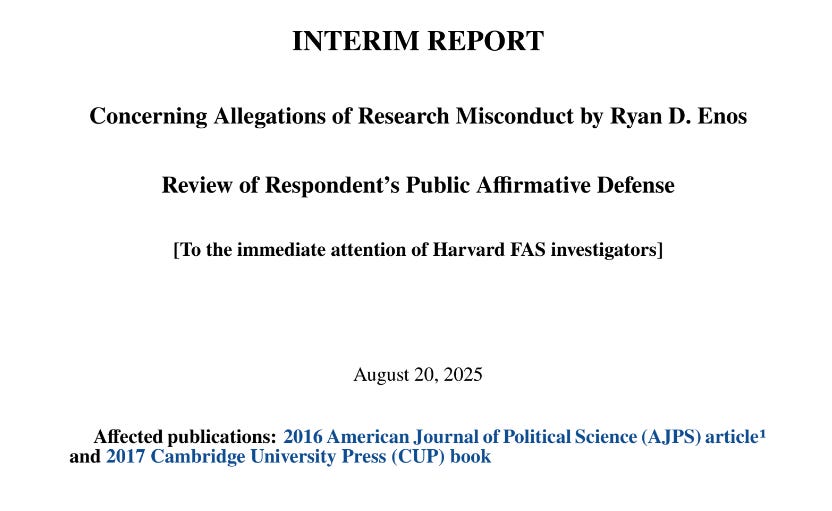
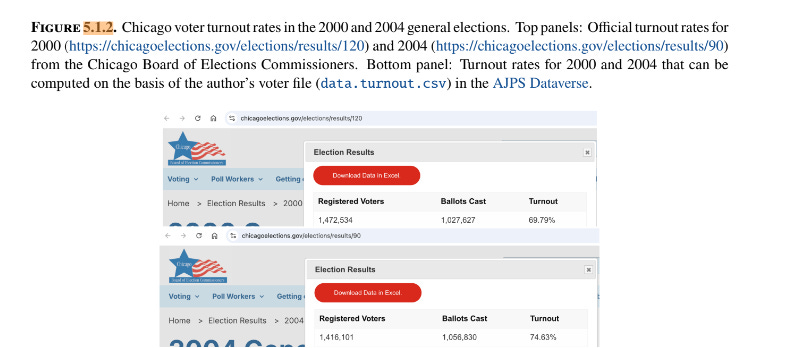
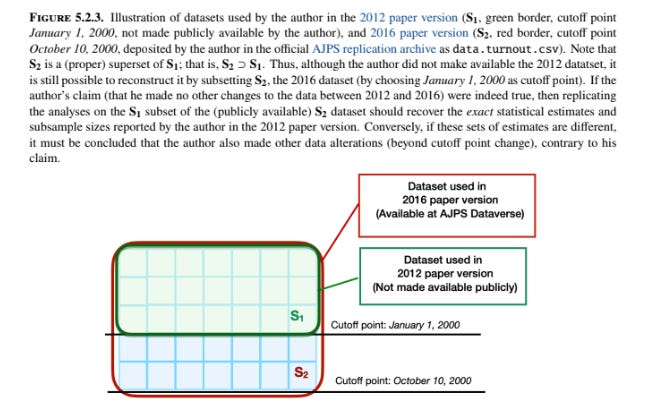
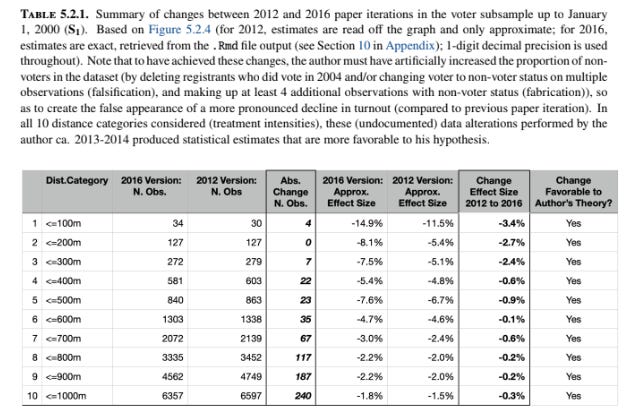
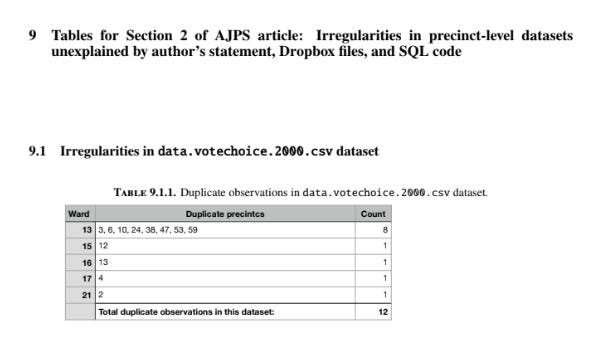
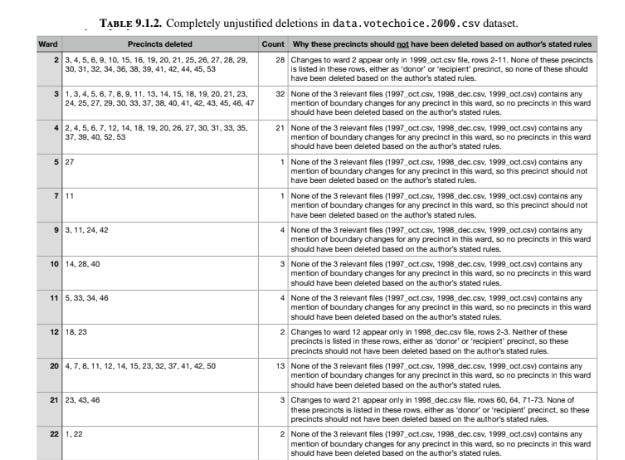
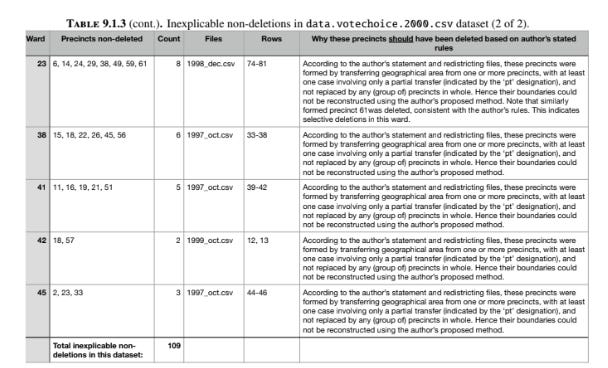
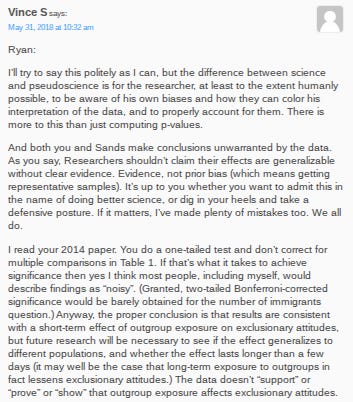
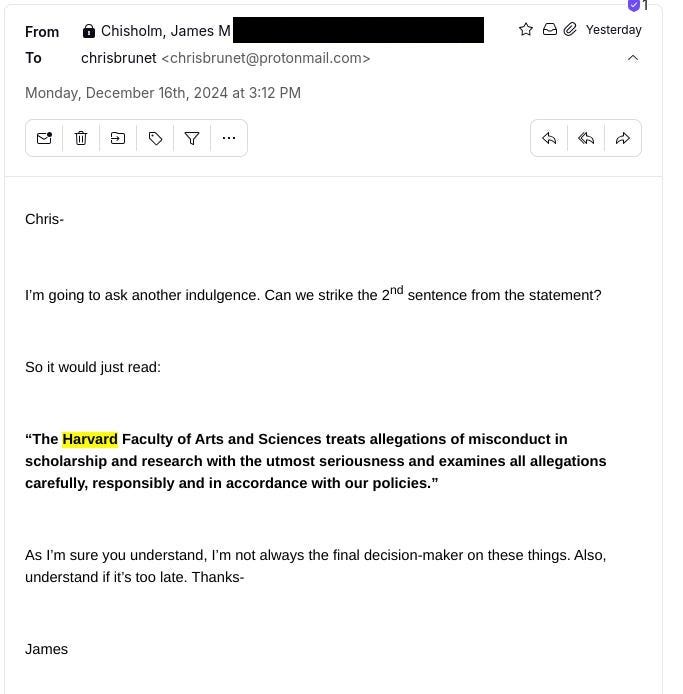


Good article. The sentence that stood out to me:
"Once bad data enters academia, it seeps into media, bureaucracy, and law."
Starting with the news on Jan 2, 2024, I had a fabulous time all year just remembering that Claudine Gay was "fired" from her job as President of Harvard University, thanks to you, Chris!